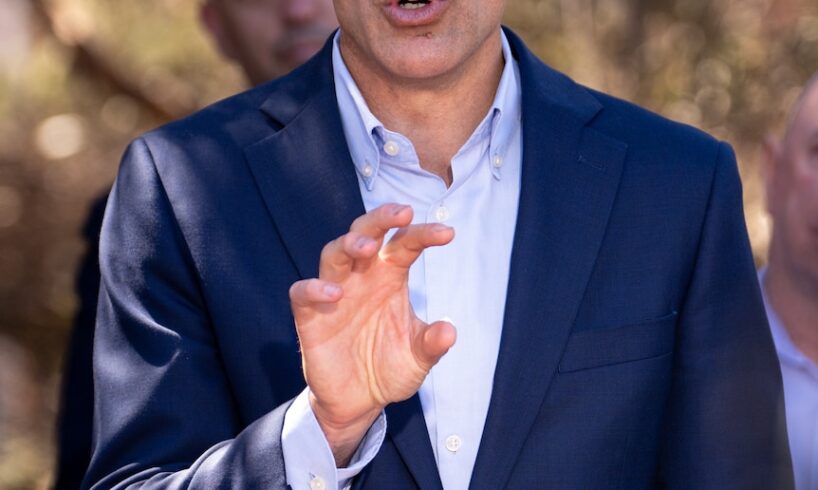
Gomeroi traditional owners have defended their legal right to challenge Santos’s Narrabri gas expansion after criticism from the South Australian premier.
Peter Malinauskas and New South Wales Premier Chris Minns both voiced support for the project at a National Energy Forum hosted by The Australian on Wednesday, with Mr Malinauskas criticising “eco-purists” for opposing it.
“My government also strongly supports the urgent development of Narrabri — despite the efforts of the Lock the Gate NIMBYs and the Greens, who have been determined to block this vital development,” Mr Malinauskas said.
Gomeroi and Anaiwan woman Polly Cutmore, who has been fighting the major South Australian gas company’s proposal since 2016, said the premier’s comments were “disgraceful.”
Gomeroi and Anaiwan woman Polly Cutmore says her people have the right to say no to developments on their native title land. (ABC News: Isabella Higgins)
“When did he become the spokesperson for Santos?” Ms Cutmore said.
“I find it very disgraceful that a South Australian premier would comment [on this] … He’s got no right to talk on our country, he’s in South Australia.”
Gomeroi traditional owner Uncle Raymond ‘Bubbly’ Weatherall, who has spent over a decade defending his lands, agreed.
“He’s probably never been to Gomeroi country to see the beauty of the Pilliga State Forest, a place of ceremony where our ancestors are buried.”
Mr Minns acknowledged the project was “controversial” but doubled down on its importance to the state’s economic development.
The fight to save Narrabri
The Narrabri gas field expansion is a multi-billion-dollar project proposed for north-west New South Wales, on land governed by a native title agreement with the Gomeroi people.
If approved, the project would see a new coal seam gas field developed over 95,000 hectares, with plans for 850 wells to be drilled and 1,000 hectares of land to be cleared.
The Pilliga Forest is home to many sacred sites for Gomeroi people. (ABC News: Brendan Esposito)
That includes significant work in the Pilliga Forest, a spiritually significant place often described as the “lungs” of Gomeroi country.
“That was a place of ceremony with regards to men’s initiation, but it’s also the centre of our nation,” Mr Weatherall said.
“You want it to be there for our kids and grandkids to appreciate it the same way we did.”
Uncle Raymond ‘Bubbly’ Weatherall says it is his obligation to stand up for his country. (AAP: Joel Carrett)
There has been significant opposition from environmental groups and regional communities to the Narrabri project since its announcement, with the NSW Independent Planning Commission receiving close to 23,000 submissions against the proposal.
The Gomeroi people have been staunchly opposed to the expansion for more than a decade.
“[Santos] have a big leak up in Darwin, so how can we trust them?” Ms Cutmore said, referring to a Santos LNG storage tank revealed to be leaking methane undetected for years.
Darwin gas leak kept secret from public in ‘national scandal’
The Gomeroi and Anaiwan elder also highlighted concerns about impacts to the Great Artesian Basin, one of the world’s largest underground freshwater resources that supplies New South Wales, Queensland, South Australia and the Northern Territory.
“Everything that lives in that ecosystem relies on that water, but it’s our medicine too,” she said.
“If they destroy Narrabri, I’m fearful of what’s going to happen next.”
Questions over gas supply
Mr Malinauskas’s office has clarified that his remarks at the forum were directed at other organisations opposing the development, telling the ABC: “The South Australian premier has a strong, consistent, and enduring respect for the rights of traditional owners.
“As the premier made clear in the speech, significant additional gas supply is vital for Australia to be able to decarbonise not only the electricity network, but heavy industry.”
Critics like the Australia Institute have said these predicted shortfalls can be addressed by reserving Australian gas for the domestic market, rather than selling it overseas.
But the spectre of climate change and its lasting impacts loom large for both Indigenous and non-Indigenous communities.
“The farmers and the non-Aboriginal community, they don’t want gas. This is the one thing that brings us together — climate change and how it’s going to affect our future generations,” said Ms Cutmore.
Dancers perform during a protest against the planned Santos Narrabri gas project in Sydney in 2023. (AAP: Dan Himbrechts)
‘The right to still say no’
The contention over the Narrabri gas plan is one of the longest-running disputes between a native title group and a company seeking to use their land.
Santos initially offered compensation to the Gomeroi for the use of their traditional lands, a figure that remains confidential but was described by Santos as “the most significant financial compensation” ever offered to a native title group by the corporation.
Ms Cutmore was in the room during those negotiations with Santos.
“I get very emotional because to have 162 of my mob say, ‘No, we don’t want that or your money, we want to protect country’, was a proud moment for me and my people,” she said, holding back tears.
“This is our country, and we got the right to still say no.”
The Gomeroi rejected the agreement and compensation offer, sending the matter to the National Native Title Tribunal (NNTT).
It was the beginning of a long legal battle that is ongoing to this day, with a final ruling yet to be made.
The Gomeroi people have this year launched another appeal, with a hearing date set for November 25.
As they await a decision, traditional owners remain steadfast in their fight to protect their country and culture.
“It’s our obligation to the people who went before us, to stand up for our country regardless of the circumstances,” Uncle Raymond ‘Bubbly’ Weatherall said.
It is a sentiment Ms Cutmore agreed with.
“We’re not protesting; this is our country, our sacred sites, our children’s future. We belong to this country and we’re not going anywhere,” she said.





